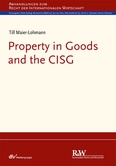565
Parties to litigation have occasionally argued that claims based on the CISG in its form as an international Convention could supersede national (insolvency) law.1159 This argument seemingly relies on the general idea that an international Convention could enjoy priority of application over “simple” national law due to a higher rank in the hierarchy of legal norms. Schmidt-Kessel rightfully highlights that the dividing line between national contract and insolvency law is irrelevant and insolvency law is superseded or preempted by the CISG as far as the scope of application of the Convention stretches.1160
566
The latter limitation holds the key to resolving the argument’s issue. To supersede the distribution of assets under insolvency law or amend the priorities, the ranking of CISG claims vis-à-vis claims by third parties would have to be a matter governed by the Convention. At no point does the wording of the CISG suggest that the relative strength of CISG claims compared to other claims to the same goods by third parties is regulated by the Convention.1161 On the contrary, the seller’s right to stoppage in transit under Article 71(2) of the CISG is limited by its second sentence to effectiveness between the buyer and the seller.1162 Whether a third party, for example like the carrier, has to respect the seller’s wish to stop the transit and handing over the goods is a matter not regulated in the CISG but subject to the oth 255 erwise applicable law.1163 The CISG only governs the rights and obligations of the parties to the contract, hence, the content of the respective claims, but not their “strength” or the question of whether they should be considered to be rights in rem.
567
This interpretation is underpinned by the historical record. The Secretariat Commentary explicitly stated that the right to require restitution under the provision that became Article 81(2) of the CISG “may be thwarted by other rules which fall outside the scope of the international sale of goods. If either party is in bankruptcy or other insolvency procedures it is possible that the claim of restitution will not be recognized as creating a right in the property or as giving a priority in the distribution of the assets.”1164 At the conference in Vienna, a Canadian delegate (Ziegel) proposed amending the provision because his delegation feared that it would also encompass the buyer’s bankruptcy and situations in which third parties’ rights were concerned.1165 The aim of the amendment was to introduce an additional paragraph in Article 81 of the CISG that would make it clear that the Convention would not interfere with the legal positions of third parties and creditors of the insolvent party.1166 Delegates of Austria (Loewe), Czechoslovakia (Kopać), and Egypt (Shafik) opposed the amendment with the main argument that the question of bankruptcy was complex and there were different approaches under national law regarding the priority between creditors. Moreover, it was not a problem that concerned sales only, which is why the matter should be considered to fall outside of the CISG’s scope of application.1167 Even though this did not persuade Ziegel,1168 the opinion that the matter fell outside the scope appears to have been held by most delegates.
568
Therefore, the relative strength of CISG claims vis-à-vis third parties’ claims is not a matter governed by the CISG. Whether, for example, the buyer’s claim based on Article 30 in case of the seller’s insolvency or the seller’s claim for restitution under Article 81(2) can be considered to enjoy priority over other claims is regulated by the applicable national law. Consequently, the CISG does not supersede national insolvency law on the available assets for distribution and priorities.


